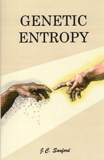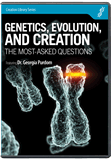More Mutant Pets!
In a society obsessed with youthfulness, wrinkles are features non grata. For some pet lovers, however, it’s the extensive wrinkling of one breed of dog that makes it so adorable.
News Source
- ScienceNOW: “A New Wrinkle on Why Shar-Peis Suffer Fevers”
Shar-pei dogs are born heavily wrinkled, but the original breed lost this trait as the dog matured. In an ongoing attempt to help shar-peis maintain their youthful folds, breeders have selected for dogs that would carry the wrinkles into adulthood. But while breeders and shar-pei lovers consider the result an aesthetic “success,” researchers now believe this mutation is responsible for what is known as Familial Shar-Pei Fever (FSF)—episodic fevers and inflammation that plague much of the breed.
The biology behind shar-peis’ wrinkles is an excess of a skin component known as hyaluronic acid. While Uppsula University geneticist Kerstin Lindblad-Toh suspected a connection between the dogs’ wrinkles and the syndrome, she did not expect that the same mutation would be responsible for both. Lindblad-Toh’s team studied the DNA of seventeen healthy shar-peis and twenty-four with FSF, locating a region on chromosome 13 that was correlated with increased susceptibility to FSF. Concurrently, the team compared fifty shar-peis with dogs from twenty-four other breeds and identified a region near a gene that codes for an hyaluronic acid-producing enzyme called HAS2.
This region overlapped with the FSF susceptibility region, and it was this location where the researchers found a mutation—duplications of a DNA segment—present in the highly wrinkled shar-peis but not in the other breeds. Moreover, a follow-up analysis of shar-peis showed that the more times the gene is duplicated, the more intense the wrinkling—and the worse the FSF. The relationship isn’t surprising, given that researchers already knew hyaluronic acid stimulates the immune system.
Dog breeders were selecting for the cute wrinkles, yes, but they were also “selecting for shar-pei fever and increasing that in frequency.”
University of Washington geneticist Joshua Akey notes that the study exemplifies the “unintended consequences of selective breeding.” Dog breeders were selecting for the cute wrinkles, yes, but they were also “selecting for shar-pei fever and increasing that in frequency,” he adds. “That’s probably generally true of a lot of traits that were selected for in dog breeding.” The sad story of shar-pei fevers is therefore a reminder of the destructive force of most mutations—even many of those that convey some benefit. Over time, such products of artificial selection as popular dog breeds often remind us that selective forces reduce genetic information rather than adding to it—the opposite of the premise of Darwinian evolution. (For more information, see “Did God Create Poodles?” and “As I Always Said: ‘It’s a Mutant!’”)
Further Reading
For More Information: Get Answers
Remember, if you see a news story that might merit some attention, let us know about it! (Note: if the story originates from the Associated Press, FOX News, MSNBC, the New York Times, or another major national media outlet, we will most likely have already heard about it.) And thanks to all of our readers who have submitted great news tips to us. If you didn’t catch all the latest News to Know, why not take a look to see what you’ve missed?
(Please note that links will take you directly to the source. Answers in Genesis is not responsible for content on the websites to which we refer. For more information, please see our Privacy Policy.)
Recommended Resources

Answers in Genesis is an apologetics ministry, dedicated to helping Christians defend their faith and proclaim the good news of Jesus Christ.
- Customer Service 800.778.3390
- © 2024 Answers in Genesis






